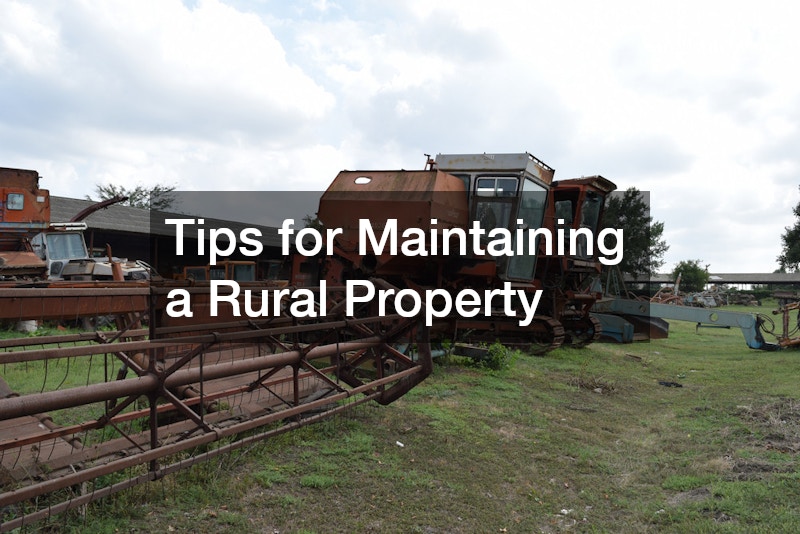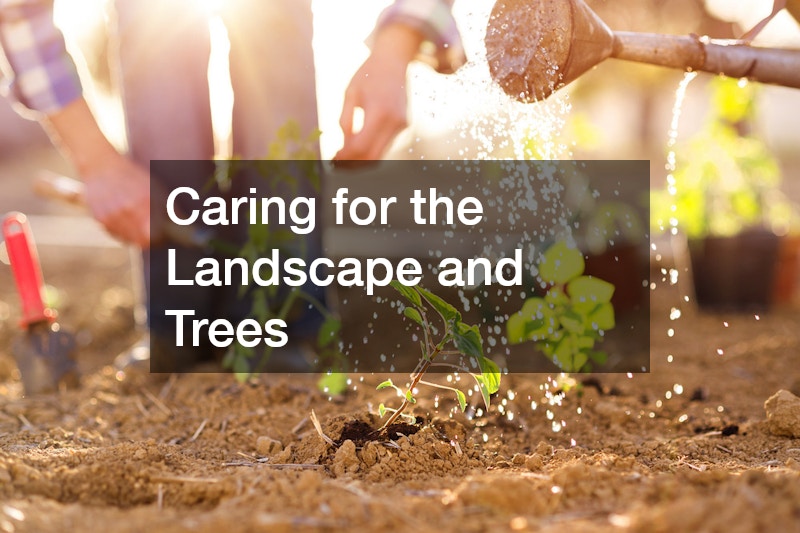Tips for Maintaining a Rural Property


Maintaining a rural property can be an incredibly rewarding experience. The open spaces, the fresh air, and the opportunity to cultivate a piece of land often draw people away from the hustle and bustle of urban life. However, with these rewards come unique responsibilities. Unlike suburban or city homes, rural properties often have extensive outdoor areas, specialized systems for water and waste, and sometimes multiple structures that each require individual attention. While every property is different, most rural homesteads share a few common maintenance concerns, such as ensuring a reliable water supply, safely managing waste, protecting buildings against the elements, and keeping equipment in good working order.
This comprehensive guide will walk you through the essentials of rural property maintenance—from checking your foundations and managing your trees to tackling more specialized tasks like well pump repairs. You’ll also learn about the best ways to handle large-scale cleanups, how to keep your property safe in various weather conditions, and how to plan out new additions responsibly. Whether you’re a newcomer seeking to make your first rural living experience a success, or a seasoned countryside homeowner looking to streamline your routines, these tips and insights will help you keep your property in tip-top shape.
In the sections below, we’ll explore a range of topics central to rural upkeep. Topics like landscaping, seasonal preparation, and hiring specialists will be touched on in detail. Of course, you’ll also find plenty of practical recommendations—ranging from how to plan inground pool installations in a rural environment to more routine tasks like scheduling tree removal or reorganizing an aging barn. Let’s dive into what you can do, step by step, to maintain and improve your slice of country paradise.
Inspecting the Main House and Foundation
A solid foundation is the bedrock of any stable home, but it’s especially important in rural areas where the ground can shift due to water saturation, freeze-thaw cycles, or even burrowing animals. Before you start dreaming of hot tubs on the back deck or new garage door installation for your workshop, spend some time ensuring the main house’s foundation and exterior walls are in excellent condition.
Foundational Checks
Begin by performing a visual inspection of the foundation. Check for cracks, bulges, or any gaps that have formed where the foundation meets the ground. Small hairline cracks aren’t always cause for alarm; they can result from regular settling. However, larger or zigzagging cracks could indicate structural issues. If you notice anything serious, consult structural engineers or experienced home builders to assess the damage.
Exterior Walls and Siding
Rural homes can be exposed to punishing weather, from high winds to ice storms. Keep an eye on your siding, whether it’s vinyl, wood, or another material. Peeling paint, mold growth, or water stains can all signify underlying damage. For instance, a rotting wooden board could be a sign of moisture buildup within the walls. Regular cleaning and repainting not only keep your home looking fresh, but also protect it from the elements.
Roof and Gutter Maintenance
An often-overlooked part of rural property maintenance is the roof. Ensure your shingles are intact and watch for curled or missing pieces. Installing gutter guards can help protect against leaves and other debris. Clean out your gutters regularly to maintain proper drainage and prevent water from pooling near your foundation.
Doors and Windows
Properly sealed doors and windows are vital for energy efficiency. Drafty entryways can also allow insects and rodents to sneak in. In a rural setting, the local wildlife may be more persistent than in urban areas. Check for gaps or broken seals around your windows and doors, and use caulking or weatherstripping where necessary. If your garage is attached or close by, consider upgrading to a modern garage door installation for better insulation and security.
Evaluating Outbuildings and Ancillary Structures

Rural properties often come with various outbuildings—barns, storage sheds, workshops, or even an outdoor entertainment pavilion. Each of these additional structures can either add value to your property or become a liability if not adequately maintained.
Assessing Structural Integrity
Begin by inspecting floors, walls, and roofs for damage or rot. Many older rural sheds and barns are made from wood, which can degrade over time if exposed to moisture or insects. Any sign of termites or wood-boring beetles is a red flag. Regular checks will help you catch these issues early. If you decide to build new structures or renovate existing ones, consult an outdoor shed builder who specializes in rural construction for personalized advice.
Ventilation and Air Quality
Ventilation is crucial in barns or workshops where fumes from paints, machinery, or livestock waste can accumulate. Proper vents and fans can reduce mildew growth and keep the interior atmosphere healthier for both people and animals. Don’t underestimate the importance of periodic deep cleaning. Sometimes, just clearing out clutter and opening the doors on a breezy day can refresh the space.
Upgrade Considerations
Outbuildings can be transformed from simple storage areas into multipurpose spaces. For example, you might convert an outdated storage shed into a cozy guesthouse or a workshop for crafts and carpentry. If you have an older detached garage, consider working with experienced home builders to modernize the structure—maybe even adding a workshop area or upgrading the floors. Before making big plans, ensure the building is structurally sound, and address any existing repairs first.
Long-Term Planning
If you have multiple outbuildings, create a schedule to handle repairs and upgrades in a phased manner. You might reinforce your oldest barn this year, plan a new garage door installation next year, and then tackle your workshop’s roof the following year. This approach helps you budget efficiently, manage your time, and avoid getting overwhelmed.
Managing Water Resources and Wells

Water management is a significant part of rural property upkeep. Unlike city homes that rely on a municipal water supply, many rural properties have wells or other private water sources. Properly maintaining these systems ensures safe, clean water for you and your family.
Well Inspections and Maintenance
At least once a year, schedule a professional check of your well and water quality. These inspections can identify issues like bacterial contamination, mineral buildup, or the need for well pump repairs. Keep an eye out for signs of trouble, including sputtering faucets, inconsistent water pressure, or discolored water. If you suspect a pump problem, call in experts for timely well pump repairs to avoid further damage.
Protecting Water Lines
In colder climates, freezing is a major concern. Insulating your pipes, especially those exposed to the elements, helps prevent expensive burst lines. If you’re digging trenches for new pipes or drainage, hydro excavation is a safer alternative to traditional digging methods. This process uses pressurized water to remove soil, minimizing the risk of damaging existing pipes or cables. In rural areas where lines can be irregularly placed, this technique can be a lifesaver.
Irrigation Systems
If you’re growing crops or maintaining a large garden, you’ll need to manage irrigation carefully. Installing efficient drip systems can reduce water usage and ensure that every plant receives adequate moisture. Regularly check irrigation lines for leaks—small cracks or breaks can go unnoticed for weeks, especially if you have a large property. Additionally, consider adding a rainwater collection system. You can use captured rainwater for your lawn or garden, reducing the strain on your primary water source.
Protecting Water Quality
Be cautious about where you dispose of chemicals or pesticides. Anything that seeps into the ground could potentially contaminate your well or groundwater. Ensure your property has clear zones around your well where you won’t store hazardous materials. Always follow safe handling and disposal guidelines for household chemicals and farm products.
Creating Comfortable Outdoor Living Spaces
One of the joys of rural living is having ample outdoor space to enjoy. Whether you’re relaxing with family or entertaining guests, creating a welcoming outdoor area can greatly enhance your quality of life.
Decks and Patios
Inspect your deck or patio for rotten boards and rusted nails. In rural settings, you may also face constant exposure to moisture, sunlight, and extreme temperature swings. Reseal wooden decks every couple of years to prevent cracking and warping. If you’re considering an upgrade, composite decking materials can be a great option because they require less ongoing maintenance than wood.
Swimming Pools and Hot Tubs
If you’re interested in adding a recreational component, inground pool installations can be an attractive option. However, it’s essential to consider factors like local climate, zoning laws, and the availability of water. Properly installed and maintained, a pool can become a social hub for friends and family. Alongside a pool, some homeowners choose to add hot tubs for year-round relaxation, even when the pool is closed during colder months. Keep in mind that each of these additions will require regular upkeep—balancing chemicals, cleaning filters, and monitoring for leaks or wear and tear.
Landscaping and Hardscaping
Paths, walkways, stone walls, or flowerbeds can transform your outdoor space. These features not only improve aesthetics but also provide safe, navigable routes around your property. If you plan to install a stone walkway or retaining wall, ensure you have proper drainage. Accumulating water can lead to erosion, frost heaves, or mold growth on the stone surfaces.
Outdoor Lighting
Rural properties are often quite dark at night, as there may be minimal street lighting. Strategically placed outdoor lights improve safety while also highlighting the features of your property. Consider solar-powered lights along walkways or around patios, and invest in motion-sensor floodlights for enhanced security.
Caring for the Landscape and Trees

A picturesque rural landscape is not just about aesthetics; it’s also critical for preventing soil erosion, preserving habitats for local wildlife, and maintaining the overall health of your property. Trees, gardens, and fields all play essential roles in your rural environment.
Tree Health and Maintenance
Trees can offer shade, shelter for wildlife, and improved air quality. However, diseased or dying trees pose a safety hazard, especially near structures or power lines. Regularly inspect your trees for signs of disease such as fungal growth, dead branches, or leaf discoloration. When it’s necessary to remove a dangerous tree, call in experts for proper tree removal. Doing it yourself without the right equipment can be risky, especially on large trees with extensive root systems.
Soil Care
Healthy soil is crucial if you plan to maintain a garden, pasture, or orchard. Periodically test your soil to determine pH levels and the presence of key nutrients. You can amend the soil with compost, fertilizers, or other organic matter to create the right environment for whatever you’re growing. Proper soil care also helps with water retention and root stability.
Weed and Pest Control
In rural areas, weeds and pests can become a significant issue. Overgrown weeds compete with desirable plants for nutrients and water. Meanwhile, small rodents or insects can quickly become a problem if they aren’t managed early. Use a combination of manual weeding, mulching, and—if necessary—eco-friendly pesticides. For larger infestations of pests like raccoons or rodents, consider consulting wildlife control professionals for humane and effective removal methods.
Landscaping for Erosion Control
If your property has slopes, plan your landscaping to minimize erosion. Terracing and planting groundcovers are two effective ways to keep the soil in place. Mulch can also help retain moisture and prevent topsoil from washing away during heavy rains. A well-landscaped property not only looks great but also helps preserve the health of your land for years to come.
Handling Waste Management and Sanitation
Efficient waste management is an integral part of rural living. When you’re far from municipal services, you’ll need to handle certain tasks yourself or hire professionals to do them for you. Properly dealing with waste, both household and agricultural, will keep your property clean, reduce odors, and help maintain a healthy environment.
Septic Systems
Many rural properties rely on septic systems instead of city sewer lines. A failing septic system can lead to sewage backups, foul odors, and environmental contamination. To avoid these issues, schedule regular inspections and pumping. The frequency will depend on the size of your household and the capacity of your septic tank, but a good rule of thumb is every three to five years.
Trash and Recycling
Depending on how remote your location is, you may not have frequent curbside pickup. Many rural homeowners use a local dump or transfer station. If you have a significant cleanup project—such as cleaning out a barn, renovating your home, or clearing a large amount of debris from your yard—a roll off container rental can be invaluable. With a roll off container on-site, you can load up all your waste in one go and have it hauled away, saving you multiple trips to the landfill.
Portable Toilets
For large gatherings, farm events, or extended construction projects, portable toilets can be a practical solution. Having these on hand not only keeps your house from being overused, but also offers convenience to guests or workers who may be scattered across your property. Just be sure to arrange for regular servicing if the event or project lasts more than a day or two.
Composting
Composting is an eco-friendly way to handle organic waste—such as kitchen scraps, yard trimmings, and even livestock manure. A well-maintained compost pile can provide rich fertilizer for your garden and reduce the amount of waste going to the landfill. Make sure your compost pile is located away from your primary living areas to prevent unpleasant odors, and turn it regularly to speed up decomposition.
Storing and Maintaining Equipment
Most rural properties rely on a range of equipment—from tractors and ATVs to lawnmowers and chainsaws. Proper storage and routine maintenance of these items will extend their life and ensure they’re ready to go when you need them most.
Organizing Your Storage Space
Whether it’s a barn, a garage, or a dedicated tool shed, your storage area should be tidy and well-organized. Label shelves and create zones for different categories of items—landscaping tools, power tools, automotive supplies, etc. Not only does this help you find what you need quickly, but it also reduces the risk of accidents. If your current space is cramped or in disrepair, consider hiring an outdoor shed builder to create a custom space that meets your specific storage needs.
Routine Equipment Checks
Regularly inspect your machinery for signs of wear. Check engine fluids, tire pressure, and battery health for larger vehicles like tractors. For smaller engines—like those in lawnmowers or chainsaws—sharpen blades and clean air filters according to the manufacturer’s recommendations. Replace worn-out parts as soon as you notice an issue, because minor problems can quickly escalate into costly repairs.
Protecting Against the Elements
Exposure to sun, rain, or snow will degrade your equipment over time. If possible, store everything under a roof. For items too large to fit inside, at least cover them with weather-resistant tarps. This is especially important in climates with heavy snowfall or intense sunlight. In addition to physical protection, consider adding a rust inhibitor or protective coating to metal parts that are prone to corrosion.
Seasonal Transition
As you switch from one season to another, do a thorough check of the equipment you’ll be using. For example, prepare your snowblower or plow in the fall, checking belts, augers, and engine fluids. In the spring, clean and lubricate lawnmowers, trimmers, and tillers. This approach ensures you’re always ready for whatever nature throws your way.
Ensuring Safety and Security
Living in a rural setting often means fewer neighbors, longer response times from emergency services, and increased exposure to wildlife. Taking the necessary safety precautions will help protect you, your family, and your property.
Alarm Systems and Locks
Even though crime rates may be lower in rural areas, it’s still wise to install basic security measures. Ensure you have sturdy door locks and consider adding an alarm system that can notify you of intruders or even carbon monoxide leaks. Modern systems often come with mobile apps, letting you keep an eye on your property even when you’re away.
Wildlife Management
Encountering wildlife is part of rural living, but it’s important to manage these encounters responsibly. Secure your garbage cans, keep compost piles covered, and consider fences or motion-sensitive lights to deter larger animals like deer or bears. If you raise livestock, ensure your pens and fencing are adequate to keep predators out.
Fire Safety
Rural areas can be more susceptible to wildfires, especially in dry climates or drought conditions. Keep a defensible space around your home by clearing away dead vegetation and trimming back trees. Install smoke detectors in all buildings, and keep fire extinguishers handy. If you have large fields or pastures, consider creating firebreaks—a strip of land cleared of any flammable vegetation.
Emergency Supplies
Given that you might be far from immediate help, always have an ample supply of basic necessities—like water, non-perishable food, flashlights, and a first aid kit. A generator can also be a lifesaver during power outages, especially if you rely on an electric pump for water. If you’re planning a major construction project, or you have a lot of guests, portable toilets can help alleviate strain on your home’s water supply and septic system in emergencies.
Preparing for Seasonal Changes

Seasonal changes can be dramatic in rural areas, bringing everything from heavy snow to intense summer heat. Getting ahead of these shifts will make your life much easier and prevent costly damage down the line.
Winterizing Your Property
Before winter, clear gutters and downspouts of leaves and debris to prevent ice dams. Inspect your driveway and walkways for cracks that could worsen in freezing temperatures. Ensure any water lines or hoses left outdoors are drained and stored properly to avoid freezing. If you have livestock, check that barns and pens are well-insulated and stock up on animal feed in case snow or ice storms delay deliveries.
Spring Cleanup
In the spring, you’ll want to remove any debris that has accumulated over the winter. Fallen branches, piles of leaves, or leftover snow piles can harbor pests. It’s also the perfect time to schedule tree removal if you identified dangerous or dying trees during winter storms. Walk around your property to see what needs fixing—look for damage to fences, outbuildings, and garden beds.
Summer Upkeep
With the warm weather comes increased growth. Mow your lawn regularly to keep ticks and other insects at bay. Keep an eye on your water sources, as high temperatures can stress wells and irrigation systems. If you’re planning inground pool installations or hot tubs, summer is typically the most convenient time to tackle these projects. Just be sure to factor in the increased workload of lawn care before adding another maintenance task.
Autumn Repairs
Fall is an excellent time to prepare for the colder months ahead. Reseal decks and fix any roof leaks before winter storms arrive. Inspect your heating systems—wood stoves, furnaces, or heat pumps—well before you actually need them. If you use firewood, start stacking and seasoning it in a dry place. Autumn is also a good time to trim trees and shrubs, as it’s easier to see damaged branches once the leaves begin to drop.
Knowing When to Call in the Professionals
Even the handiest rural homeowner can benefit from professional expertise. Certain tasks—like large-scale construction, complex electrical work, or well pump repairs—are best handled by specialists who have the right tools and experience.
Major Renovations and Construction
If you’re adding a new wing to your home or converting a barn into a guest suite, professional home builders can help you navigate permits, zoning laws, and structural requirements. These experts can also advise on the best materials for a rural setting, where weather extremes are common.
Specialized Excavation Work
When you need to dig trenches for new water lines, septic systems, or other underground utilities, hydro excavation is often the safest method. Hiring pros reduces the risk of accidentally damaging existing lines, which can save you both time and money. Plus, some projects, like a roll off container area or new outdoor shed foundations, might require precision digging to ensure a stable base.
Large-Scale Tree Removal
While trimming small branches is manageable for most property owners, removing a large tree or tackling multiple dangerous trees is a job for experts. Tree removal professionals not only have the right equipment, but they also know how to fell a tree in a controlled manner, minimizing the risk of damage to property or injury to people.
Pool and Spa Installation
While some property owners might be tempted to do it themselves, inground pool installations and setting up hot tubs require careful planning to meet safety codes and ensure proper filtration systems. A qualified contractor can handle the excavation, plumbing, and electrical requirements that come with these additions.
Owning a rural property is a dream for many, offering unparalleled privacy, space, and a closer connection to nature. However, these benefits come with their own set of responsibilities and challenges. From managing your well and septic system to scheduling timely tree removal, every decision impacts the health, safety, and longevity of your homestead. By focusing on regular inspections, preventative measures, and responsible upgrades, you can enjoy your rural lifestyle without sacrificing comfort or security.
The payoff for all this work? Waking up to the sound of birds instead of traffic, gazing up at star-filled skies free from city lights, and having the freedom to shape your land exactly how you want. By integrating the tips outlined in this guide, you’ll create a property that serves as both a sanctuary from urban stress and a proud reflection of your hard work. Rural living is about embracing independence and responsibility—and with proper care, your rural property can thrive for generations to come.